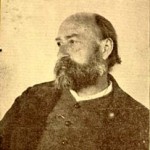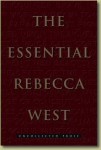I know that had I been able to do what I liked, and that is just what I have not been able to do, I would have written nothing but novels. Fiction and poetry are the only way one can stop time and given account of an experience and nail it down so that it lasts forever. All other forms of literature yield opinions and facts. But an account of what one sees and hears and feels and tastes and the emotional judgments of those sensory events, and the establishment of the relationship of those findings to the rest of one’s life; that one can only do in a novel or a poem.
The exact rendering of experience was what I wanted to do from an early age, because the moment I looked around I was made familiar with the uses of literature. There was a lot of stuff lying around my house. As a family, we had the advantage of reading very quickly and remembering what we read, and the talk of our parents joined on what we read to our lives. My father had the great advantage of having as tutor a famous Frenchman, Élie Reclus, a geographer and early vulgarisator of science, and ultimately a prominent figure at the Free University in Brussels. He had been engaged to teach my father and his brothers by their widowed mother, who met Reclus when he was an exile in Dublin. She was Anglo-Irish, and an impassioned  member of the Protestant Established Church, which the English foisted on Catholic Ireland, and she assumed that any French person who was a refugee from France must be a Protestant in flight from the wicked Catholics. She was wrong. Reclus was an Anarchist and had gone into hiding because he and some friends had seized the Town Hall in the course of a rising against Napoleon III.
member of the Protestant Established Church, which the English foisted on Catholic Ireland, and she assumed that any French person who was a refugee from France must be a Protestant in flight from the wicked Catholics. She was wrong. Reclus was an Anarchist and had gone into hiding because he and some friends had seized the Town Hall in the course of a rising against Napoleon III.
He accepted the post quite innocently, without any attempt to deceive, because she had told him she was a member of the Plymouth Brethren, and he had imagined that this was a small revolutionary body. When he discovered the truth he behaved with great correctness. He said nothing. He liked my grandmother, he liked her sons, and he thought he could teach them better than the next man, and he made it a rule never to recommend to them any idea of which their mother might disapprove; and there was forged a bond between them which became to me the sign of his appreciation of the random nature of human life, and the queer ways human beings counter it and impose a kind of order. Out of bigotry my grandmother had engaged the best possible kind of tutor for her sons, in fact the tutor most likely to prevent them from growing up bigots themselves.
This anecdote still rings in my ears and so does an anecdote my mother used to tell. She had in her youth been courted by a man so rich that his name was used over quite a large area as a symbol of riches. They went on a picnic-party, he proposed to her, and she accepted him. But on the way home he realised that he had left his umbrella on the site of the picnic, and made such a fuss, was so seriously grieved, that she realised that he was not the husband she wanted, and the next day she broke off the engagement. What was valuable in this story was her candour about her emotions and her refusal to let it cocme to rest on a romantic falsity. Yes, she had rejected a philistine, but she wasn’t, she owned, really a heroine. She saw that the thing would not do, but she was terribly disappointed, so disappointed that she shed a tear or two, because she was not going to enjoy unromantic and philistine security.
People were odd and they were complicated, and so complicated that however my father and mother’s stories began one never knew how they were going to end, whether one would laugh or be sad, and life itself had that same unpredictable quality. Sometimes it turned out to be terrible. I had one relative who converted my childhood into pure panic whenever she managed to find herself alone with me. She was not a blood relation, she was the wife of my father’s cousin, and far too often she came with an air of one about to distribute gifts, though all she gave was advice. I was frightened of her first of all because she was so large and I was so small, and though she had an immense bosom, she reminded me of a bull. It was partly her eyes, which were empty of anything but ferocity, and the way she held her head down and forward, as if about to charge. I always remembered her in later life, when my husband had a Jersey herd, and I used to help the vet with the T. B. inoculations, and one of our bulls was always nasty.
She used to get me alone, but she knew that my parents would have disapproved of her conversation. She always thought fit to remind me that my father had lost all his money, and that by his own fault, which was not strictly true, and that in consequence I would starve when I grew up unless I could earn my living, and this I would never be able to do, because I was so stupid, lazy, and for one reason or another, as unacceptable to the community as a leper. I very soon came to the conclusion that this was not the way a really nice lady would behave, and I used to find the excuse for leaving the room and resorting to the society of my sister Winifred, who was six years older than I was. She had a remarkable memory for verse and a beautiful voice, and it was her habit to soothe any irritation caused by such grown-ups as fairly could be classed in our language as rogue elephants, by reciting verse, Tennyson, or William Morris or Walter Raleigh or Wyatt or Marvell.
On either side the river lie
Long field of barley and of rye
She used to tell me; or again,
Give me my scallop-shell of quiet,
My staff of faith to walk upon
Or again,
He hangs in shakes the orange bright,
Like golden lamps in a green night.
Thus I discovered that personal sorrows could be relieved by a beautiful picture, which could be as vivid if it were written down on paper in words as if it were painted on canvas, and would be fixed in the memory, to be returned to for comfort or sheer pleasure. Later on, when I came to read Shakespeare at school, I learned that style could do more than that. I listened to my teachers and my fellow pupils and myself reading aloud from the poor immortal’s words and turning them to dust, and I used to go home and ask my sister to read me the same passages, and at once the reason for Shakespeare’s immortality struck on the ear. There was no doubt but that literature could do more than explain the random nature of life and the complications of human nature, it could abstract by the senses a knowledge of beautiful objects, and of objects not in themselves beautiful but seen with style, and make a powerful medicine of it. I take it that this apprehension does something to get one the voice of the novelist. It is equivalent to voice production.
In these ways I made a general approach to the lay-out of writing. But I found myself faced with certain difficulties due to my place in time … For one thing I needed money. I had no capital behind me, and I had to meet heavy expenses, so I had to engage in journalism. I had to write articles, and this is death to novel writing. One has to write good articles if one is to to capture the market, and this means shifting one’s attention totally for the time being from any novel one may be writing, and it dries up the steady flow of the imagination. But I need not blame my need for money for my unfaithfulness to novel writing, for I had another and nobler reason for taking to journalism. After the First Wolrd War one had to notice the world was changing. Heavens, how quickly, how drastically the world was changing. Can you blame me if I ran about the world watching it cast its own skin and put on the new? Can you wonder if I felt an urgent necessity to take an inventory of Yugoslavia, a country I loved, because I knew it was bound to be overrun either by Germany, or from Russia’s direction by Communism; which would destroy its character, and blot out its inheritance from Byzantium? So I spent five years writing Black Lamb and Grey Falcon; and during the war I broke my knuckles on a brick wall protesting against the betrayal of Yugoslavia, which had not been a Communist country and had a Communist government forced on it by Great Britain and America.
And after the war I felt obliged to report the Nuremburg Trials, the Fascist-Communist riots in the East End of London, a lynching trial in a Southern State, a murder trial which happened in consequence of a system of trade controls, various treason trials. I think I should have been rather dumb-witted if I hadn’t done these chores, and if I hadn’t periodically visited the United States of America to see how one of the two Great World Powers was getting on with the business of preparing itself to guard the peace of the world. But I cannot fool myself that my spying journeys on the world made me the more able to write novels. I have indeed often come home from my travels with the conviction that quite soon people would not read novels because human beings would have forgotten how to read, as part of a general amnesia that would leave them with no memories except perhaps the technique for shooting arrows.
On this note, the reader is heartily urged to consult “The Duty of Harsh Criticism,” from The New Republic of November 7, 1910.
From “The Novelist’s Voice,” an unpublished essay by Rebecca West appearing for the first time in The Essential Rebecca West: Uncollected Prose
For more, read “Why My Mother Was Afraid of Cats,” renamed “Pounce” in The New York Review of Books
In addition to the books linked above, most of West’s essays on the Nuremberg and treason trials are available in The New Yorker archive. West’s essay on the London riots, “Anti-Semitism in London: 1: Not a Riot But a Racket” (Evening Standard, Sept. 29, 1947) has apparently not been anthologized.
For an excellent bibliography of West’s many books and essays, click here.
For yet more, try Geoff Dyer’s introduction to Black Lamb and Grey Falcon in The Guardian
[No unauthorized copying or republishing without permission of Pearhouse Press, Inc., www.pearhousepress.com.]